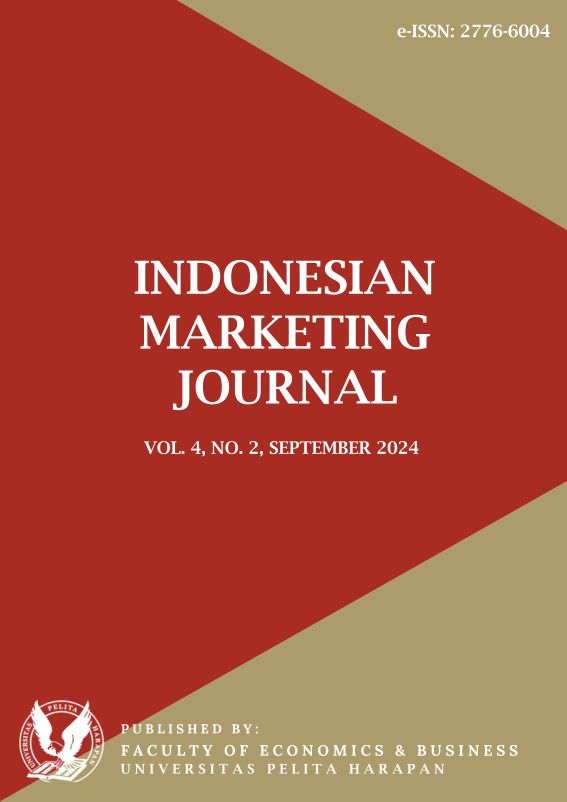The Impact of Service Quality, Employee Competency, and Digitalization on Patient Satisfaction at X Clinic
DOI:
https://doi.org/10.19166/imj.v4i2.9763Λέξεις-κλειδιά:
Healthcare Worker, Service quality, Digital Marketing, Patient experiential satisfaction, Utilization of TechnologyΠερίληψη
This study aims to analyze the effect of service quality, employee competence, and digitalization on patient satisfaction in clinics. In the digital era, the integration of technology and the competence of healthcare personnel are critical to enhancing service quality and overall patient experiences. Using a quantitative approach, this study applies Structural Equation Modeling (SEM) with Partial Least Squares (PLS) and collects data through a Likert-scale questionnaire. A total of 100 clinic patients were selected as respondents using purposive sampling. The independent variables in this study are service quality, employee competence, and digitalization, while patient satisfaction is the dependent variable. Data was analyzed using SmartPLS to test construct validity, reliability, and inter-variable relationships. The results reveal that all three independent variables have a significant positive influence on patient satisfaction, with digitalization showing the strongest effect, followed by employee competence and service quality. The R-squared value of 0.623 indicates that 62.3% of the variance in patient satisfaction can be explained by the model. These findings suggest that clinics should prioritize digital transformation and continuous development of medical staff competencies, alongside maintaining service quality. The study contributes to the literature by confirming the importance of digital healthcare tools in improving patient satisfaction and providing a foundation for future research to explore additional variables and long-term impacts of digitalization in healthcare.
Αναφορές
Al-Assaf, K., Bahroun, Z., & Ahmed, V. (2024). Transforming service quality in healthcare: A comprehensive review of healthcare 4.0 and its impact on healthcare service quality. In Informatics, 11(96), 1–53. https://doi.org/10.3390/informatics11040096
Andik, M., & Ratnasari, S. D. (2023). Professional competency and employee performance in the digitalization era mediated by employee engagement. International Journal of Business Marketing and Management, 8(1), 41–51.
Hair, J. F., Hult, G. T. M., Ringle, C. M., & Sarstedt, M. (2020). A primer on partial least squares structural equation modeling (PLS-SEM). Sage Publications.
Nasution, S. W., Lumbanraja, D. R., & Ginting, C. N. (2023). The influence of human resources competency and service quality on general patient satisfaction that impact on return visits at the Husein Family clinic. Jurnal Penelitian Pendidikan IPA, 9(12), 11803–11807. https://doi.org/10.29303/jppipa.v9i12.4807
Nguyen, N. X., Tran, K., & Nguyen, T. A. (2021). Impact of service quality on in-patients’ satisfaction, perceived value, and customer loyalty: A mixed-methods study from a developing country. Patient Preference and Adherence, 15, 2671–2684. https://doi.org/10.2147/PPA.S333586
Putra, M. D. P., Djogo, Y. O., & Rulia, R. (2024). Analysis of the influence of medical personnel competence and service quality on patient satisfaction and its implications on patient loyalty. Indonesian Research Journal on Education, 4(4), 2162–2168. https://doi.org/10.31004/irje.v4i4.1602
Saputri, A. R., & Manik, M. J. (2024). Analysis of human resources competence in the digital era as staff qualifications and education in quality improvement at Kartika Husada Hospital in 2023. Journal of Social Science and Business Studies, 2(4), 310–315. https://doi.org/10.61487/jssbs.v2i4.108
Λήψεις
Δημοσιευμένα
Τεύχος
Ενότητα
Άδεια
Πνευματική ιδιοκτησία (c) 2025 Patricia Yoe, Natasha Estella Bastiaan , Alvin Edwin Wiyono

Αυτή η εργασία είναι αδειοδοτημένη υπό το Creative Commons Attribution-ShareAlike 4.0 International License.
Authors who publish with this journal agree to the following terms:
1) Authors retain copyright and grant the journal right of first publication with the work simultaneously licensed under a Creative Commons Attribution License (CC-BY-SA 4.0) that allows others to share the work with an acknowledgement of the work's authorship and initial publication in this journal.
2) Authors are able to enter into separate, additional contractual arrangements for the non-exclusive distribution of the journal's published version of the work (e.g., post it to an institutional repository or publish it in a book), with an acknowledgement of its initial publication in this journal.
3) Authors are permitted and encouraged to post their work online (e.g., in institutional repositories or on their website). The final published PDF should be used and bibliographic details that credit the publication in this journal should be included.


